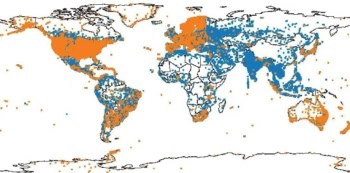
Volcanoes could intensify their activity as the climate warms, increasing their threat to the aviation and agricultural industries. That’s according to a study published in Earth-Science Reviews.
Claire Cooper of the University of Leeds, UK, together with collaborators from Leeds and the University of Cambridge, warns that the likelihood of large volcanic eruptions could increase as climate warms and glaciers retreat. Such eruptions release ash clouds that can damage jet aircraft, reduce crop yields, and harm animals and humans that breathe in the particles.
As glaciers reduce in size, the land around them “rebounds” since it is no longer weighed down by ice. In turn, the pressure on any underground magma chambers reduces, allowing more rock to melt. This increased volume of magma enhances volcanism above.
Volcanic eruptions may affect the climate in many ways, from causing warming by releasing greenhouse gases to, more often, cooling by emitting reflective compounds. Such global cooling events place enormous strain on agriculture by shortening growing seasons and reducing the amount of sunlight reaching the ground.
Volcanic ash clouds have more direct effects too. They cause respiratory problems for animal and human populations over huge areas, and have the potential to cause major damage to jet engines, grounding flights across whole continents. The 2010 eruption of the Icelandic volcano Eyjafjallajökull closed European airspace for more than a week, causing £1.1 billion of losses to the airline industry. The eruption of Bali’s Mount Agung in November 2017 also disrupted flights in and out of the island. If global climate continues to warm, these incidents could become more frequent as volcanism increases.
Volcanoes could represent a new, yet potentially devastating, component of the challenges the planet faces if the climate continues to warm.



